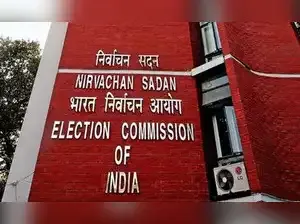New Delhi: At the heart of the political debate on the Election Commission's Special Intensive Revision (SIR) of electoral rolls in Bihar is the new pre-printed 'Enumeration Form' which every elector will have to fill within a month and back it up with supportive documents, if he did not figure in the state's 2003 electoral rolls.
This is different from the state's previous 'intensive' revision undertaken in 2003 when enumerators came for house-to-house verification with a working copy containing details of existing electors in a row with a blank row beneath for correction in the existing particulars and for capturing details of newly eligible person.
The'Enumeration Form', to be first deployed in Bihar and scaled across the country, comes pre-printed with details on the elector's name, old photograph, EPIC number, address and constituency details. Each elector will have to affix a new photograph and fill in date of birth, mobile number but adding Aadhaar number is 'optional'. Since an intensive revision was done in 2003, those on the electoral roll will not need to provide any additional documents but just add an extract of the roll along with the enumeration form. Officials said this would cover bulk of electors in any state.
For the rest, document submission is necessary which include nearly a dozen categories from government identity cards to family register, land allotment, educational certificate and so on.
TIMELINE CHALLENGE
The timeline for the above exercise makes it challenging for the electoral machinery in Bihar. Between June 25 and July 26, enumeration forms must reach each elector and be submitted with documents online or physically. Booth Level Officers will do house to house enumeration and attempt at least three visits to collect filled-up forms and hand out receipt acknowledgements. Even in case of online uploading of enumeration form, the BLO will verify documents during the HTH visit. Those who do not submit the enumeration form by July 25, will not have their name included in the draft electoral roll. However, no name will be deleted from the roll without proper inquiry and fair opportunity to elector affected.
The draft electoral roll is to be published by August 1 and the final roll by September 30 after due period for claims and objections. The draft and final electoral rolls will be put out on the CEOs' website and shared with recognised political parties.
GROUNDWORK
A nine-member EC team is currently in Bihar holding meetings on conducting the SIR. Trainings have begun for BLOs to EROs on the new revision process. The CEO office has started a public outreach drive with advertisements in newspapers and social media. Meetings are being lined up with representatives of all political parties to apprise them of the drive. They will also be asked to appoint a Booth Level Agent at every polling booth to assist with and help verify in the roll revision exercise.
The CEO will be putting out claims-objections reports on a weekly basis on their website along with data on applications on correction/addition/deletion of elector names.
This is different from the state's previous 'intensive' revision undertaken in 2003 when enumerators came for house-to-house verification with a working copy containing details of existing electors in a row with a blank row beneath for correction in the existing particulars and for capturing details of newly eligible person.
The'Enumeration Form', to be first deployed in Bihar and scaled across the country, comes pre-printed with details on the elector's name, old photograph, EPIC number, address and constituency details. Each elector will have to affix a new photograph and fill in date of birth, mobile number but adding Aadhaar number is 'optional'. Since an intensive revision was done in 2003, those on the electoral roll will not need to provide any additional documents but just add an extract of the roll along with the enumeration form. Officials said this would cover bulk of electors in any state.
For the rest, document submission is necessary which include nearly a dozen categories from government identity cards to family register, land allotment, educational certificate and so on.
TIMELINE CHALLENGE
The timeline for the above exercise makes it challenging for the electoral machinery in Bihar. Between June 25 and July 26, enumeration forms must reach each elector and be submitted with documents online or physically. Booth Level Officers will do house to house enumeration and attempt at least three visits to collect filled-up forms and hand out receipt acknowledgements. Even in case of online uploading of enumeration form, the BLO will verify documents during the HTH visit. Those who do not submit the enumeration form by July 25, will not have their name included in the draft electoral roll. However, no name will be deleted from the roll without proper inquiry and fair opportunity to elector affected.
The draft electoral roll is to be published by August 1 and the final roll by September 30 after due period for claims and objections. The draft and final electoral rolls will be put out on the CEOs' website and shared with recognised political parties.
GROUNDWORK
A nine-member EC team is currently in Bihar holding meetings on conducting the SIR. Trainings have begun for BLOs to EROs on the new revision process. The CEO office has started a public outreach drive with advertisements in newspapers and social media. Meetings are being lined up with representatives of all political parties to apprise them of the drive. They will also be asked to appoint a Booth Level Agent at every polling booth to assist with and help verify in the roll revision exercise.
The CEO will be putting out claims-objections reports on a weekly basis on their website along with data on applications on correction/addition/deletion of elector names.








